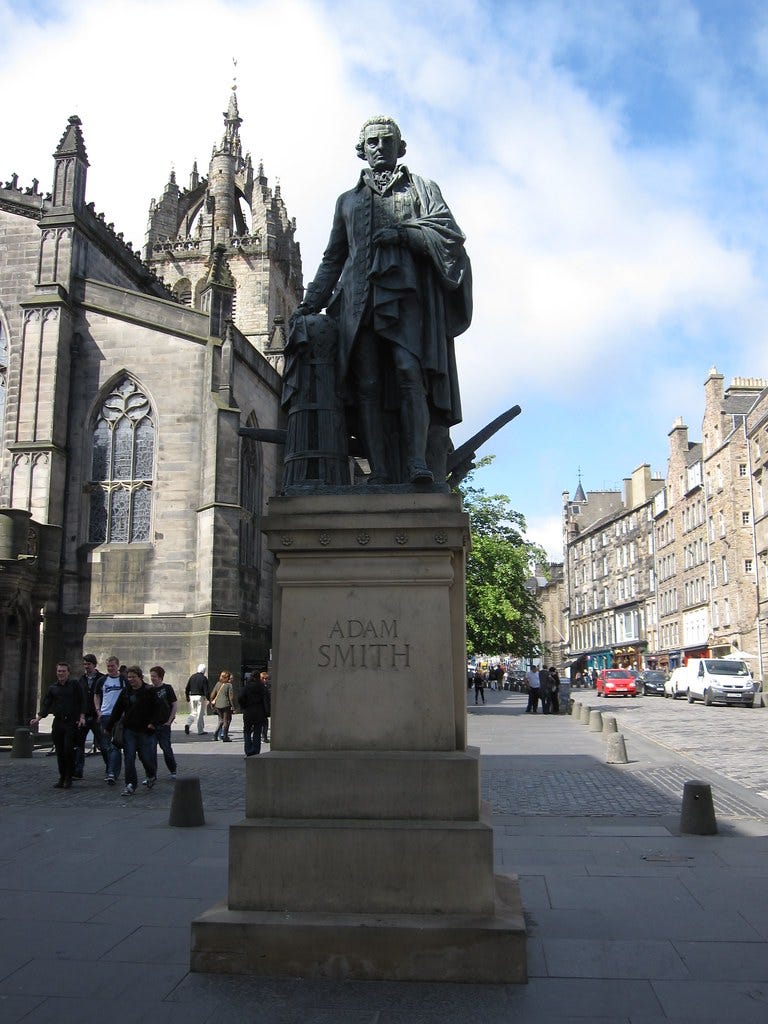Part 1 of a Discussion of Peter Foster’s Why We Bite the Invisible Hand Chapter 2 “The Sage of Kirkcaldy” In this chapter, Peter Foster follows Adam Smith through the years as he developed his ideas that were enshrined in his two books, The Theory of Moral Sentiments in 1759 and The Wealth of Nations in…

Capitalism Needs a PR Team
Part 2 of a Discussion of Peter Foster’s Why We Bite the Invisible Hand Chapter 1 “Cardboard Cut-out Capitalism” Peter Foster notes in his book that capitalism is a word everyone uses, often with negative connotations, but seldom define. (p. 24) Defining capitalism is one of the key sticking points for authors…

Why is Our Culture Hostile to Capitalism?
Part 1 of a Discussion of Peter Foster’s Why We Bite the Invisible Hand Chapter 1 “Cardboard Cut-out Capitalism” The title of journalist Peter Foster’s book definitely captured my attention: Why We Bite the Invisible Hand. The invisible hand is a metaphor from Adam Smith that we use in economics to describe how the economy…

The Next Turning Point
A Discussion of Oliver DeMille’s 1913 Chapter 13 “The Last Turning Point” As Oliver DeMille concludes his book, he titles his last chapter, “The Last Turning Point,” which I find bleak, though perhaps that was not the intention. I prefer the idea of the next turning point. He opened his…

A Lazy People Cannot Remain Free
A Discussion of Oliver DeMille’s 1913 Chapter 12 “Free Citizens Read the Fine Print” If you are familiar with the U.S. government system at all, you know a key idea of the Founders is to use checks and balances to divide power. The Senate contends with the House. Both together…

We Are Blind to the True Value of Our Freedom
A Discussion of Oliver DeMille’s 1913 Chapter 11 “Essential Freedom” Oliver DeMille has detailed in his book how we took a turn away from freedom in 1913, and for that reason he focuses on the importance of freedom in this chapter. How can we regain our freedom if we do…

Tribal Leaders Needed to Revive the Basis of American Freedoms
A Discussion of Oliver DeMille’s 1913 Chapter 10 “Solution #3: Tribal Leaders” In Oliver DeMille’s third chapter on solutions, he is calling for tribal leaders to lead the new turning point towards freedom. The true freedom system includes establishing as the most basic unit of society — next to the family — small government…

We Need Good Readers and Thinkers
A Discussion of Oliver DeMille’s 1913 Chapter 9 “Solution #2: Voracious Readers and Independent Thinkers” DeMille called for “a small but committed few” to adopt his solutions to undo the damage to freedom by the 1913 turning points. (p. 89) While he called for an increase in entrepreneurship in the…

Entrepreneurship as a Solution
A Discussion of Oliver DeMille’s 1913 Chapter 8 “Solution: #1 Entrepreneurship” DeMille notes the entrepreneurial spirit is a part of the American culture, but it can be threatened by an ever-growing federal government. He says the founders were considering what type of national character the new country was going to…

We Only Need a Few to Restore Freedom
A Discussion of Oliver DeMille’s 1913 Chapter 7 “Wanted: A Small Group of Committed Citizens” Oliver DeMille began laying out his case for what it will take to undo the 1913 turning points away from freedom the last chapter. And as I went through his suggestions, I said I was worried because…

